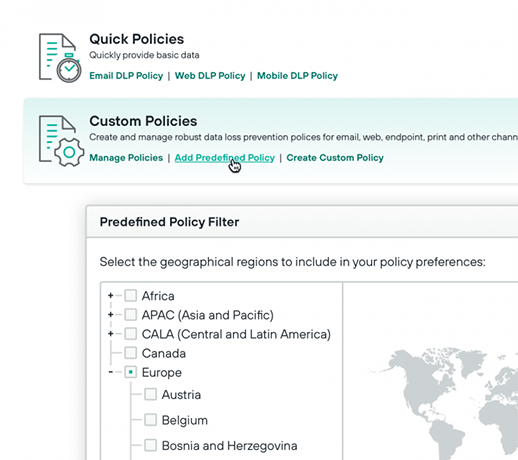12K+ customers couldn't be wrong










































Apply industry-leading data security to your emails in minutes.
Get agentless control over outbound emails and prevent exfiltration where it's needed most. Forcepoint DLP solution for Email delivers industry-leading control over the top vector for data theft.
Why Forcepoint DLP for Email

Eliminate multiple DLPs with one console. Configure and deploy policies from a single user interface across email, web, cloud, and endpoints using the Forcepoint Data Security platform.
Easily deploy on major email providers such as Microsoft Exchange, Gmail for Business, and others. Configure and publish policies in less than five minutes.
Deploy from and save emails on on-premises or the cloud, with no sensitive data storage in the cloud necessary. Take advantage of existing Microsoft encryption capabilities to better protect your data.
Forcepoint DLP for Email runs in the AWS cloud, providing 99.99 percent uptime with no scheduled downtime, so your data stays secure at any time of day.

DLP Deployment:
In the Cloud or On-Premises
Deploy Forcepoint DLP in the cloud (SaaS) or on-premises. With implementation support from the Forcepoint professional services team, your organization can see time-to-value in as few as six weeks!


IDC Marketscape: DLP Vendors 2025
Forcepoint was named a Leader in the IDC MarketScape: Worldwide DLP 2025 Vendor Assessment. Discover which criteria Forcepoint DLP excelled in by downloading the full report.
Analyst recommended.
User approved.
Forcepoint is consistently ranked among the top Data Loss Prevention software and data security software providers by users and industry analysts.

Forcepoint has been named a Leader in the IDC MarketScape: Worldwide DLP 2025 Vendor Assessment.
Forcepoint named the 2024 Global DLP Company of the Year for the second consecutive year by Frost & Sullivan.
Forcepoint recognized as a Strong Performer in The Forrester Wave™: Data Security Platforms, Q1 2025.
Frequently Asked Questions
What is Data Loss Prevention for Email?
An Email DLP solution helps organizations prevent sensitive data within email from being lost, leaked, misused or accessed by unauthorized individuals. It monitors outbound messages and searches for any content or attachments that may be sensitive, confidential, private or protected by regulation. When a message that contains sensitive data is found, email DLP systems may flag it, block it or delete it based on security policies.
Learn more about this product through our comprehensive guide.
Why is a DLP solution for email important for organizations?
Since email is a predominant form of business communication, Email data loss prevention is now considered an essential data security technology. Email DLP solutions are designed to help address the many potential causes of data leaks and loss, including cyberattacks, malicious insiders, security negligence and human error.
What are the key features of a DLP for email solution?
Some key features of Forcepoint DLP for Email are:
- Managing policies from one dashboard
- Effortlessly integrating with Microsoft and Gmail
- Maintaining data sovereignty and integrity
What are the benefits of a DLP for email solution?
With a DLP for email solution, such as Forcepoint DLP for Email, organizations can get control over data by extending policy coverage to outbound emails. More specifically, it provides agentless control over outbound emails and prevents exfiltration where it's needed most.
How does Forcepoint Email DLP help Philippine enterprises comply with the Data Privacy Act?
The Philippines' Data Privacy Act (DPA) mandates organizations to implement reasonable and appropriate measures to protect personal data. Forcepoint Email DLP solution assists enterprises in meeting these requirements by providing advanced data classification and policy enforcement capabilities. It can help detect and control sensitive information, including personal identifiers and confidential records, within email communications. By offering detailed audit trails and incident reporting, the solution allows companies to demonstrate compliance with the DPA's accountability and security principles.
What types of email threats does DLP for email protect against?
Email messages and attachments may contain a variety of sensitive material, including Social Security numbers, credit card information, intellectual property, financial data and more. Given the importance of safeguarding sensitive information in emails, DLP for email helps protect data against threats such as the following:
- Inadvertent leaks
- Insider threats
- Cybercriminals
Can Forcepoint DLP for Email integrate with Microsoft and Gmail?
Absolutely. With Forcepoint DLP for Email, organizations can easily deploy on major email providers such as Microsoft Exchange, Gmail for Business and others.
How does Forcepoint Email DLP support data security in outsourced business process environments in the Philippines?
The Philippines is a global leader in BPO and shared services, handling vast volumes of customer and client data daily. These environments are high-risk for data leaks due to large agent workforces, distributed teams and strict SLA-driven operations. Forcepoint Email data loss prevention mitigates these risks by applying policy-based controls that monitor email content, restrict unauthorized sharing and trace policy violations without slowing performance. Its real-time fingerprinting and policy orchestration allow sensitive records to stay protected even during high-volume processing.
Why is a secure email gateway important for organizations?
Secure email gateways offer protection against malicious messages and attachments. By using robust email security solutions, organizations can dramatically reduce the number of successful and attempted attacks against their business.
How does a secure email gateway work?
A secure email gateway offers a robust framework of technologies that protect against email-borne threats. Most secure gateways offer a minimum of four security features: virus and malware blocking, spam filtering, content filtering and email archiving.

